Life Goes On
2022-02-24TextbyZhouXin
Text by Zhou Xin
From Delta to Omicron,the COVID-19 pandemic shows no signs of retreat.The Chinese government has coordinated COVID-19 prevention and control with economic and social development.Vaccination gives people a chance to get back to normal life.They need to show a vaccine passport often or get a nucleic acid test sometimes,but with the pandemic under control in the country,people work,dine,and enjoy themselves almost as they did before.Life goes on.

December 30,2021:Students from an elementary school in Beijing display their paintings celebrating the upcoming 2022 New Year’s Day. IC
Regular Epidemic Prevention and Control
In 2021,regular epidemic prevention and control measures had Chinese people accustomed to showing green health codes before entering indoor public spaces,and getting nucleic acid tests when traveling.The green health code works as a digital pass for people to move around.
Health codes,nucleic acid testing,and vaccination have become rote for Chinese people in 2021.As of December 29,2021,31 provinces (autonomous regions and municipalities) and the Xinjiang Production and Construction Corps had reported a total of more than 2.8 billion doses of COVID-19 vaccines.

December 22,2021:The Central Street,a centuryold commercial pedestrian street in Harbin,Heilongjiang Province,is packed with tourists and shoppers as night falls.With the hard work of all parties,Harbin has so far cleared all areas with medium and high COVID-19 infection risks,and life has largely returned to normal. Visual People
Social Network Visualization
Image sharing applications from Instagram to China’s Xiaohongshu have become integral to millions of lives.People can take photos anywhere and anytime with a high-pixel phone camera and upload them in a second thanks to improvements in communication technology.Photo editing and beautification software allows people to improve photo quality in the blink of an eye.At the same time,a growing aesthetic requirement has also driven the development of social network visualization.

May 18,2021:A tourist poses in front of a graffiti wall in Mafangwan,southwestern China’s Chongqing Municipality.Formerly dilapidated residential buildings have been transformed into a fairytale world and become a popular spot for visitors to take photos and post them online. IC

September 13,2021:An aerial view of a photovoltaic power station under which is a fishpond at the Dali Reservoir in Feidong County,Hefei City,capital of eastern China’s Anhui Province. IC
Carbon Peaking and Neutrality
China mapped path to carbon peaking and neutrality in the documentsand,unveiled on October 24.The documents evidence China’s determination to pursue green and low-carbon development and its will to actively tackle climate change.
Peaking carbon emissions and reaching carbon neutrality will require extensive and profound systematic change both economically and socially.The key is to follow a new development philosophy and live and work in a greener way.To make it happen,governments,businesses,and individuals all need to change.

A staff at a civil affairs office affixes a “nullified” seal on a marriage certificate,declaring the termination of the marriage. IC
Cooling-off Period
Under the new,which came into effect on January 1,2021,couples have a 30-day cooling-off period after handing their divorce application to the civil affairs department.During the period,either party can withdraw the application.
China’s rising divorce rate has become an important reason for the introduction of the cooling-off period.In 2020,the number of registered marriages nationwide was 8.13 million,and the number of registered divorces was 3.73 million.China’s divorce rate increased for 17 consecutive years from 2003 to 2019.
Studies show that the top three killers of marriages are domestic trivia (34.21 percent),long-term separation (30.16 percent),and lack of commitment (8.31 percent),followed by infidelity,incompatibility,and financial troubles.
Classmate Zhang
Getting up,opening the curtains,feeding a pig,brushing teeth,and washing face… The Chinese rural lifestyle depicted in Zhang Kai’s rustic videos attracted millions of viewers seeking to reminisce about childhood or curious about the countryside and eager to escape reality.
Zhang is far from the only example of a Chinese video blogger posting their daily lives on short-video platforms and gaining popularity.Douyin and Kuaishou are among the largest short-video applications in China.Douyin is reported to have more than 600 million daily active users,and Kuaishou more than 300 million.Short-video applications have become inseparable from people’s lives.
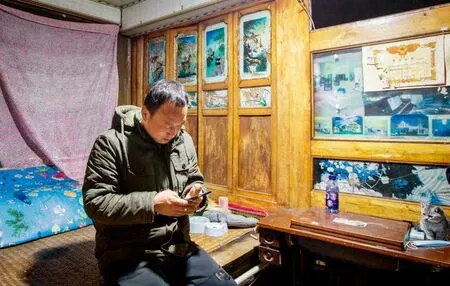
December 7,2021:Zhang Kai,who posts on the account name “Classmate Zhang,” edits a video at night.The man from Yingkou City in northeastern China’s Liaoning Province became an internet sensation by posting his daily life on short-video platform Douyin,the Chinese version of TikTok. VCG
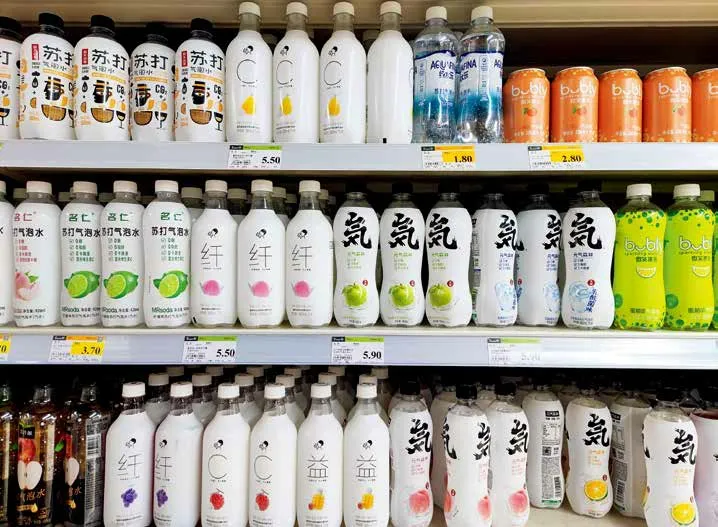
December 25,2021:Sugar-free and zero-calorie drinks on shelves in a supermarket in Beijing.by Zhou Xin/China Pictorial
Sugar-Free Lifestyle
Recent data showed that the overweight rate of adults in China aged 18 and older is 34.3 percent,and the obesity rate is 16.4 percent.Statistics showed the prevalence of diabetes in Chinese adults is 12.8 percent,and the number of Chinese people with diabetes exceeds 100 million,the highest number among all countries in the world.
Sugar-free drinks mainly targeted overweight people and gym-goers.However,more consumers have turned to sugarfree drinks due to increased health consciousness.Businesses have also seen the huge opportunities and made great efforts in advertisement.In 2020,China’s market size of sugar-free beverages was valued at 11.78 billion yuan (US$1.85 billion),seven times as much as the number of 2014.
Double Reduction
Chinese authorities introduced a set of guidelines in 2021 to reduce the burden of excessive homework and off-campus tutoring for students undergoing compulsory education,known as “double reduction”policy,to create a healthy education atmosphere.The policy is intended to improve the overall quality of school education,ease excessive study burden,enable students to have more time for hobbies,and protect their mental and physical health.
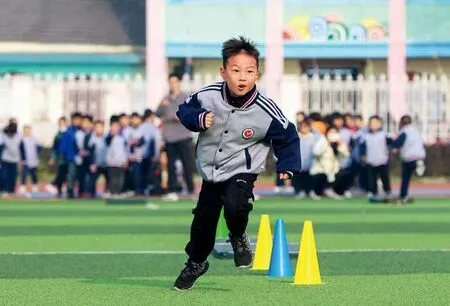
December 9,2021:A student runs in a relay race in Xiangyang City,central China’s Hubei Province. IC
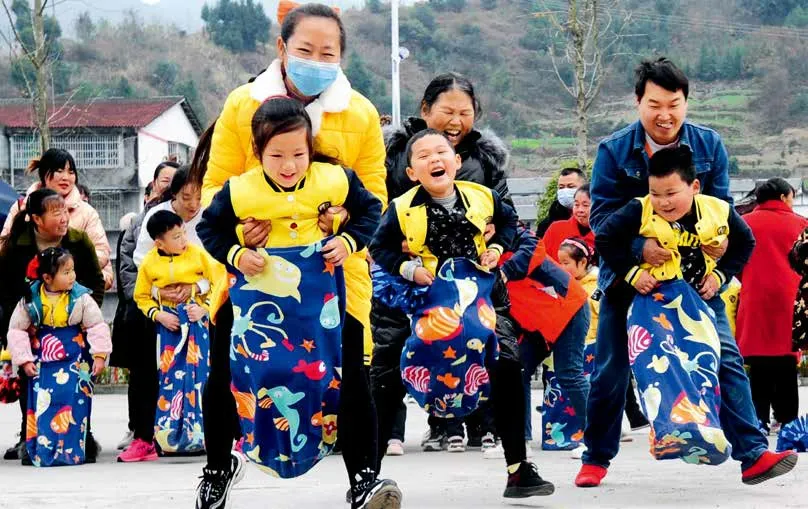
December 7,2021:Parents carry their children in “pockets” and rush to the finish line in a game held at the Central Kindergarten of Hongshi Town in Chongqing Municipality.Since the release of the third-child policy,governments at all levels have introduced incentives such as holidays and tax deduction to promote the implementation of the policy. IC
Third-Child Policy
China decided to further ease the family planning policy,allowing all couples to have three children,and to beef up support policies.The decision was declared at a meeting of the Political Bureau of the Communist Party of China (CPC) Central Committee on May 31,2021.
The net increase of China’s population from 2019 to 2020 was 2.04 million,the lowest since 1962,according to thereleased by the National Bureau of Statistics.More than half of Chinese women who had planned to have a second child finally gave up,according to the 2019 national demographic and household survey.Policies in education,housing,and employment affect couples’ childbearing decisions.Due to concerns about the economic burden,childcare service and work-life balance,many parents have been reluctant to have a second child even after the two-child policy was rolled out in 2016.
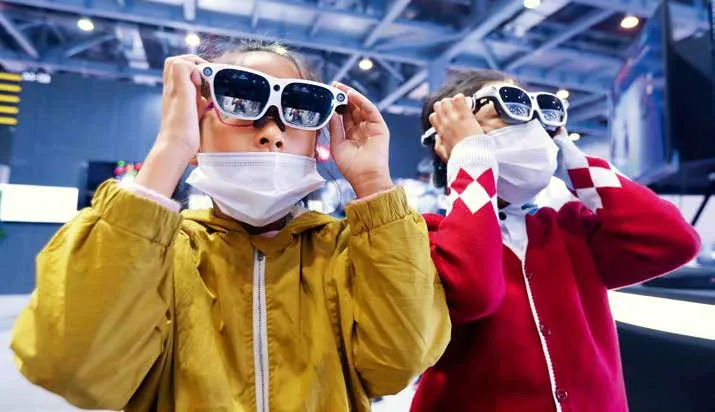
October 20,2021:Two girls wearing MR (mixed reality) smart glasses experience holographic technology at the 2021 World VR Industry Expo in Nanchang,capital of Jiangxi Province. IC
Metaverse
The term “metaverse” was coined by American science fiction writer Neal Stephenson in his 1992 novel.About 80 percent of augmented reality (AR)/virtual reality(VR) products in the world,including hardware,software and applications,are made in China.China also boasts two of the world’s top five VR companies.
released by the New Media Research Center of Tsinghua University noted that the epidemic has weakened people’s connections in the physical world and strengthened the demand for virtual interaction.Time spent online throughout society has increased significantly,and the “home economy” has developed rapidly.Online and offline have been connected,human real life has begun to migrate to the virtual world on a large scale,and humans are becoming real and digital “amphibious species.”
Internet Acronyms
Is there anyone around you a “PUA” (gaslighter)? The “pyq”(moments) he shared on WeChat really made me “xswl” (laugh out loud).Social media platforms like Weibo and WeChat have integrated into the daily life of Chinese people with the development of the mobile internet.Internet acronyms,first popular in fan and e-sports circles,have started trending among young netizens.
For example,“yyds” means “eternal god” and describes an outstanding person or thing.It’s similar to “GOAT” (Greatest of All Time) in English.Originating with e-sports players,the term quickly went viral on the internet.Netizens use “yyds” to praise films and television shows,cheer for Olympic athletes,and describe scenery and food they are fond of.

May 14,2021:A featured character at the Kakao Friends store in Shanghai,China.It is the first flagship store of this brand in the country.Stuffed animals sold in the store are designed based on the emoticons released by KakaoTalk,a South Korean mobile messaging app launched in 2010. IC
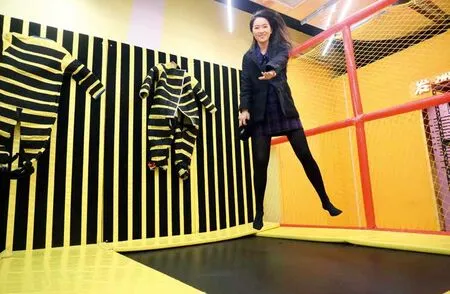
August 27,2021:A customer experiences indoor sports activities in a popular pressure-easing gym in Huaihai Road,a commercial street in Shanghai. IC
Involution
The word “involution” was first proposed by American anthropologist Clifford Geertz in the bookand became a buzzword in China in 2021.College students use it to refer to the prevalent sense of being stuck in a draining rat race.The phenomenon is also part of professional life where peers work harder to compete for limited resources but don’t result in greater growth.
Involution is used broadly to convey a general feeling of defeat when people put in extra effort that doesn’t improve their lives—whether to describe the fierce competition between candidates for further studies or the grinding work culture in various sectors.Ultimately,the word summarizes the conflict between limited resources and infinite desires.
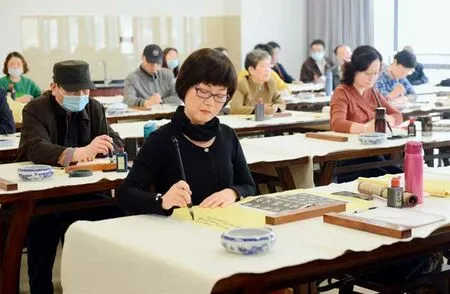
April 12,2021:Offline calligraphy classes resume at a community college for seniors in Fuzhou City,southeastern China’s Fujian Province,as the epidemic situation has stabilized in the country. IC
Lifelong Learning
Statistics show that the proportion of China’s population aged 65 and above in 149 cities at the prefectural level and above reached 14 percent in 2020.How can the quality of life of the elderly be improved? About 76,000 colleges (schools) in China had offered programs to nearly 11 million senior citizens by the end of 2019.Online education for seniors has been on the rise.
China has stepped up efforts to close the digital gap for the elderly.The country requires traditional human service be retained in public places like supermarkets,hospitals,and banks to help the elderly overcome barriers that smart technologies bring.Some cities have launched initiatives to train the elderly to use smart technologies,and companies have been asked to adapt software to better serve elderly consumers.
